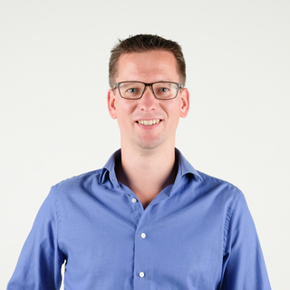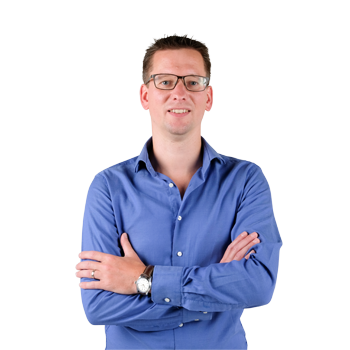Not everyone is aware that there’s a whole world behind the development of potato varieties. Potatoes are transformed into all sorts of products of varying in shapes and size: from crisps and French fries to the boiled potato in your sausage & mash. But before reaching your plate, your potato has been on quite a journey. Involving planting, plant breeders' rights, weather conditions, different countries and more... World leader in potato varieties Agrico enlisted the help of CQM to make that journey as efficient as possible. Maximising the benefits to other stakeholders, from growers and breeders to importers and consumers.

Agrico is a cooperative world leader when it comes to new potato varieties, seed potatoes and ware potatoes. They’re involved with both cultivation (by and for growers) and selling for consumption (end-customer). It’s Agrico's job to bring these two markets together as efficiently as possible. Jan Hoogenboom, an Information Manager at Agrico, wanted to do one more thing before he retired: implement a new IT system containing a matching algorithm with which Agrico can make data-driven decisions.
International market
“At Agrico, our growers produce seed potatoes that we then sell to the market as profitably for them as we can, explains Jan. “The market is international: Dutch seed potatoes are used in some 80 countries worldwide. And because each country sets certain requirements and preconditions for the potatoes it imports, there are hundreds of different varieties and quality properties. This means there’s a huge number of variables. As you can imagine, a given potato will do better in one country than another, due to different climates and soil types. Agrico is also involved in ware potatoes, because, of course, potatoes are used in many different ways: cooking, baking, frying and so on. This makes the potato market highly diverse and very challenging."
Matching supply and demand
“We engaged CQM specifically for the production and trade of the seed potatoes produced by our growers,” continues Jan. “This involves a major matching process: which party from which grower need to go to which customer? This was previously done manually and required a lot of brain power and hard work. I thought: it should be possible to automate this process, and in doing so also create improvements. In addition, there had to be quality improvements to be had by delivering more valuable solutions. CQM confirmed my assumptions and I immediately saw them as the people for the job. CQM'ers have a really nice down-to-earth mindset, tons of experience and a shedload of knowledge. Especially in the field of optimisation.”
Lots of diversity in matching
“Agrico's customers don't just choose a variety. They choose a variety from a specific class, in a specific format, in a specific quantity, and so on,” explains Jacob Jan, jointly responsible for the project for CQM. “A country's quality requirements and import duties also play a role. In other words, there are more than enough aspects to be taken into account on the demand side when finding a suitable party. And then there’s the supply side: most growers have multiple plots on which they grow seed potatoes, and produce a mountain of potatoes per plot. The quality, quantity and composition of these potatoes must be mapped out. And then translated into how best to sell them and how to optimally sort those mountains by size to minimise any loss? That’s an interesting, non-standard matching challenge of the type we love to get stuck into at CQM.”

On the left: Jan Hoogenboom (Agrico) and on the right: Jacob Jan Paulus (CQM).
Feasible sales plan?
“With CQM's algorithm,” says Jan, “we can plan ahead and get a glimpse into the future. Before, we simply met the customer's request without looking ahead, which often resulted in leftovers. Now we can see at a glance just how large that surplus is, its properties and whether there’s a customer who can use it. So we see exactly how we can prevent surpluses by matching leftovers with other demands in the market, or by selling them on the consumer market. Added to which, at Agrico we work by harvest year: harvesting takes place in September and all production has to be gone by June. This makes you dependent on what has been harvested — you can’t produce on the side. But because in September we now already have an overview of the various mountains of potatoes, we can see whether our sales plan is feasible and adjust it accordingly. So the algorithm gives us more than just matching the right grower to the right party and customer.”
“At the start of the season the algorithm selects the right parties, based on demand expectations, and converts them virtually into saleable products,” explains Jan. “Thereby not only taking into account the composition, quality and quantity; but also the possibilities of using a higher quality product for a specific demand. Take organic potatoes. It’s a pity to sell them in a market where there’s no demand for them, which will sometimes be unavoidable if you have no such further insight and need to respond rapidly to a shortage. But that’s now a thing of the past, as the algorithm provides insight into the discrepancies between supply and demand, and is able to optimize the matching. As a result, the risk of having to disappoint clients is greatly reduced."
Predicting the future
“In the future,” Jan continues, “we want to expand our use of the CQM algorithm, for example to also optimise transport and include that in the matching process. Ultimately, we want to be able to see and predict even further into the future. Could we, for example, give growers an annual plan, so they know well in advance for which purposes they have to sort in order to prevent waste and respond optimally to demand? Do that and we’re moving from tactical to strategic decision-making, making ourselves of even greater value to our growers.”
Translating conceptual thinking into practice
“I’m very happy with this project done in collaboration with CQM,” says Jan in conclusion. “I’m a conceptual thinker myself, just like the people at CQM. But they also know how to translate that into practical solutions. Plus you see people in the potato sector have a great passion for their profession, and that’s something the mathematicians at CQM certainly share. And when two such passions come together, wonderful things can happen. Which is great, as it means CQM can also play a role in the change management this project involves. The algorithm requires a different perspective and way of working. It’s now up to us to prove its added value and convey that to everyone. So when I shortly set off to enjoy my retirement, I’ll be leaving this project in Agrico’s hands with confidence.”
Do you want this to?
Contact Jacob Jan! And if you’d also like to stay informed on the latest news from CQM, follow us on LinkedIn or sign up for our digital newsletter.
Fotocredits: CQM.


